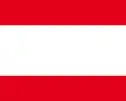Karl Eberhard Herwarth von Bittenfeld
Karl Eberhard Herwarth von Bittenfeld (4 September 1796 – 2 September 1884) was a Prussian field marshal (German: Generalfeldmarschall).
.jpg.webp)
Biography
Herwarth von Bittenfeld was born in Werther, Thuringia, into an aristocratic family which had supplied many distinguished officers to the Prussian army.
Herwarth von Bittenfeld entered the infantry with the 2nd Guards Regiment in 1811, and served through the War of Liberation (1813–15) of the Napoleonic Wars, distinguishing himself at Lützen and Paris. During the years of peace he rose slowly to high command. In the Berlin revolution of 1848, he was on duty at the royal palace as colonel of the 1st Guards. [1] Major-general (German: Generalmajor) in 1852, and lieutenant-general (German: Generalleutnant) in 1856, he received the grade of general of infantry and the command of the VII Corps in 1860.[2]
In the Second Schleswig War in 1864, Herwarth von Bittenfeld succeeded to the command of the Prussians when Prince Frederick Charles of Prussia became commander-in-chief of the allies, and it was under his leadership that the Prussians forced the passage into Als following the victory over General Steinmann on 29 June, ending the war soon after. [2] Bittenfeld was appointed commander of the VIII Corps that autumn. On 29 June he also received the Pour le Mérite (military class) order.
In the Austro-Prussian War, Herwarth commanded the Army of the Elbe which overran Saxony and invaded Bohemia by the valley of the Elbe. His troops won the actions of Hühnerwasser and Münchengrätz, and at Königgrätz formed the right wing of the Prussian army. Herwarth himself directed the battle against the Austrian left flank.[2]
Returning to command of the VIII Corps after the war, Herwarth von Bittenfeld became a member of the Reichstag of the North German Confederation from 1867 until 1870. He would continue to plan the defense of western Germany against a possible French offensive until July 1870. [2]
In 1870, during the Franco-Prussian War, Herwarth von Bittenfeld was not employed in the field, but was in charge of the scarcely less important business of organizing and forwarding all the reserves and material required for the armies in France and later overseeing prisoner of war camps when the threat of French invasion was eliminated. In 1871, his great services were recognized by promotion to the rank of field-marshal. The rest of his life was spent in retirement at Bonn, where he died in 1884. Since 1889 the 13th (1st Westphalian) Infantry carried his name.[2]
Honours and awards
He received the following orders and decorations:[3]
.svg.png.webp) Kingdom of Prussia:
Kingdom of Prussia:
- Pour le Mérite (military), 29 June 1864[4]
- Grand Cross of the Red Eagle, with Oak Leaves and Swords
- Knight of the Prussian Crown, 1st Class with Oak Leaves
- Grand Commander's Star of the Royal House Order of Hohenzollern, with Swords
- Commander of Justice of the Johanniter Order
- Service Award Cross
- Knight of the Black Eagle, with Collar, 1866
.svg.png.webp) Baden: Grand Cross of the Zähringer Lion, 1852[5]
Baden: Grand Cross of the Zähringer Lion, 1852[5] Austrian Empire:[6]
Austrian Empire:[6]
- Commander of the Imperial Order of Leopold, 1854
- Knight of the Iron Crown, 1st Class, 1863
- Knight of the Military Order of Maria Theresa, 1864
 Ascanian duchies: Grand Cross of Albert the Bear, 8 November 1857[7]
Ascanian duchies: Grand Cross of Albert the Bear, 8 November 1857[7].svg.png.webp)
.svg.png.webp)
.svg.png.webp) Ernestine duchies: Grand Cross of the Saxe-Ernestine House Order, November 1857[8]
Ernestine duchies: Grand Cross of the Saxe-Ernestine House Order, November 1857[8] Grand Duchy of Hesse: Grand Cross of the Ludwig Order, 4 July 1871[9]
Grand Duchy of Hesse: Grand Cross of the Ludwig Order, 4 July 1871[9] Hohenzollern: Cross of Honour of the Princely House Order of Hohenzollern, 1st Class with Swords
Hohenzollern: Cross of Honour of the Princely House Order of Hohenzollern, 1st Class with Swords Principality of Lippe:
Principality of Lippe:
- Cross of Honour of the House Order of Lippe, 1st Class with Swords
- Military Merit Medal
 Mecklenburg-Schwerin: Military Merit Cross, 2nd Class
Mecklenburg-Schwerin: Military Merit Cross, 2nd Class Netherlands: Grand Cross of the Netherlands Lion
Netherlands: Grand Cross of the Netherlands Lion.svg.png.webp) Ottoman Empire: Order of Osmanieh, 1st Class
Ottoman Empire: Order of Osmanieh, 1st Class Russian Empire:
Russian Empire:
- Knight of St. Anna, 2nd Class
- Knight of St. Stanislaus, 2nd Class
Notes
- The New International Encyclopædia 1905.
- Chisholm 1911.
- Handbuch über den Königlich Preussischen Hof und Staat. 1883. p. 165.
- Lehmann, Gustaf (1913). Die Ritter des Ordens pour le mérite 1812–1913 [The Knights of the Order of the Pour le Mérite] (in German). 2. Berlin: Ernst Siegfried Mittler & Sohn. p. 454.
- Hof- und Staats-Handbuch des Großherzogtum Baden (1862), "Großherzogliche Orden" 62
- "Ritter-Orden", Hof- und Staatshandbuch der Österreichisch-Ungarischen Monarchie, 1883, pp. 114, 131, 161, retrieved 5 February 2021
- Hof- und Staats-Handbuch des Herzogtum Anhalt (1867) "Herzoglicher Haus-orden Albrecht des Bären" p. 20
- Staatshandbücher für das Herzogtums Sachsen-Altenburg (1869), "Herzogliche Sachsen-Ernestinischer Hausorden" p. 25
- Hof- und Staats-Handbuch des Großherzogtum Hessen (1879), "Großherzogliche Orden und Ehrenzeichen", p. 23
References
- Wawro, Geoffrey, The Austro-Prussian War. Austria's war with Prussia and Italy in 1866 (New York 2007).
- Gilman, D. C.; Peck, H. T.; Colby, F. M., eds. (1905). . New International Encyclopedia (1st ed.). New York: Dodd, Mead.
Attribution
 This article incorporates text from a publication now in the public domain: Chisholm, Hugh, ed. (1911). "Herwarth von Bittenfeld, Karl Eberhard". Encyclopædia Britannica (11th ed.). Cambridge University Press.
This article incorporates text from a publication now in the public domain: Chisholm, Hugh, ed. (1911). "Herwarth von Bittenfeld, Karl Eberhard". Encyclopædia Britannica (11th ed.). Cambridge University Press.